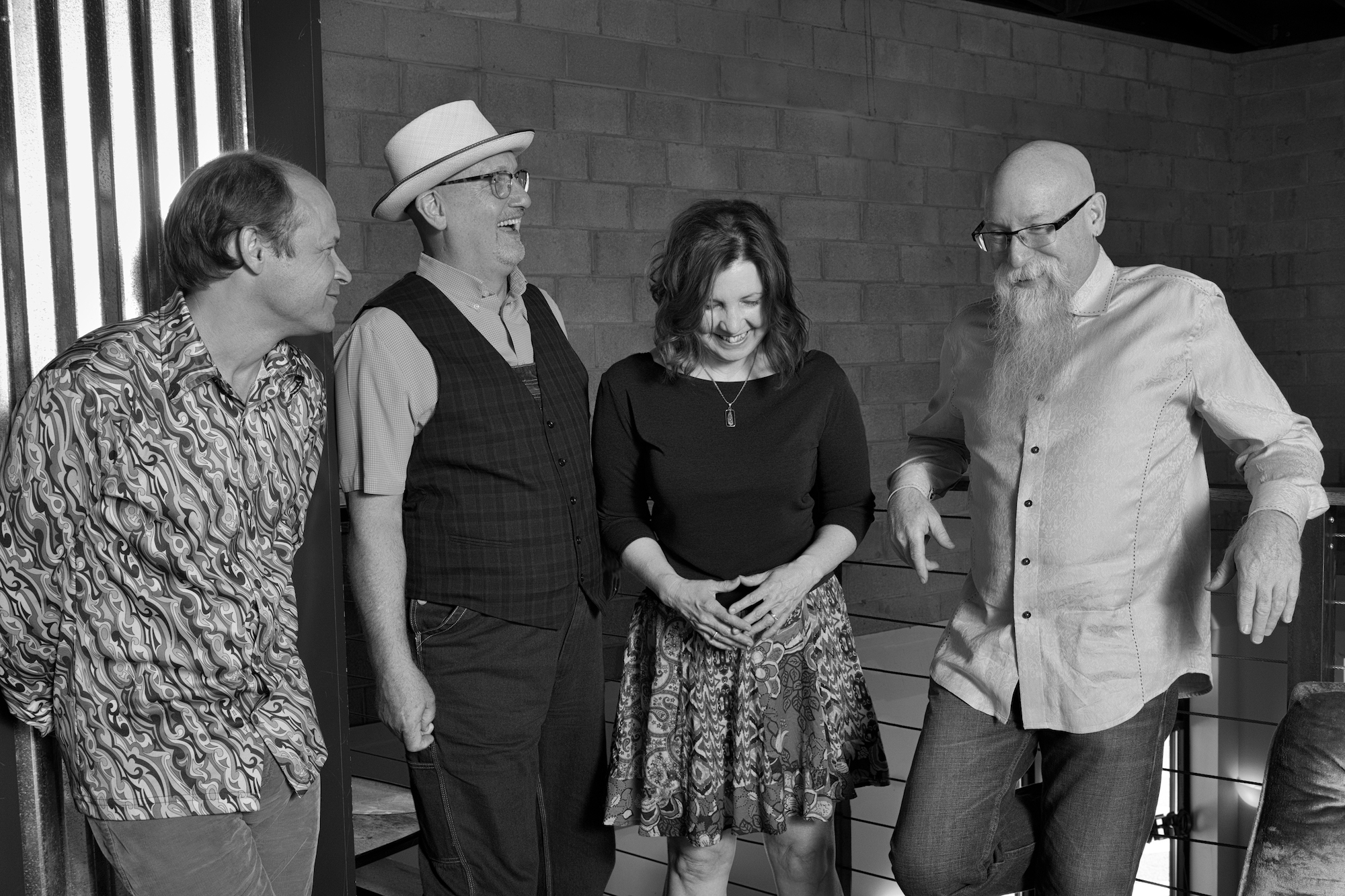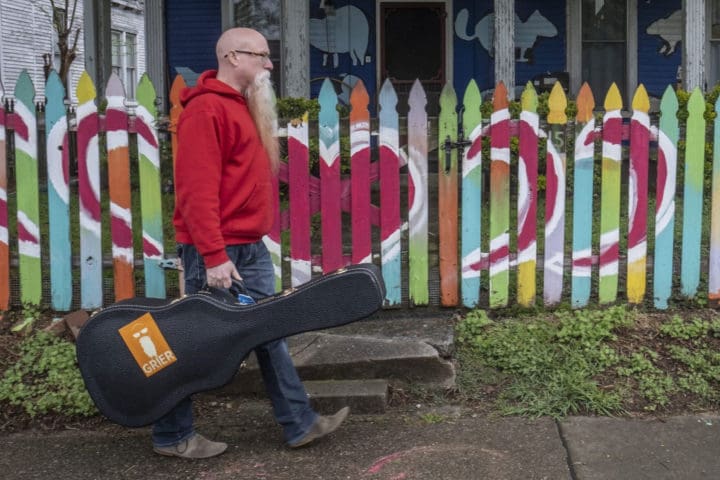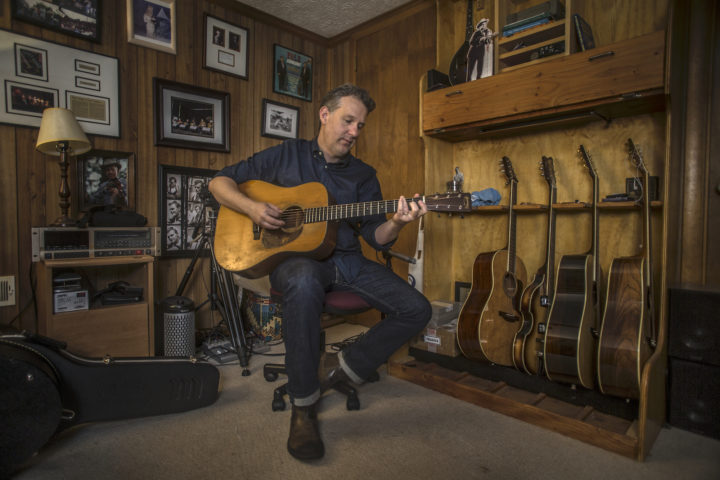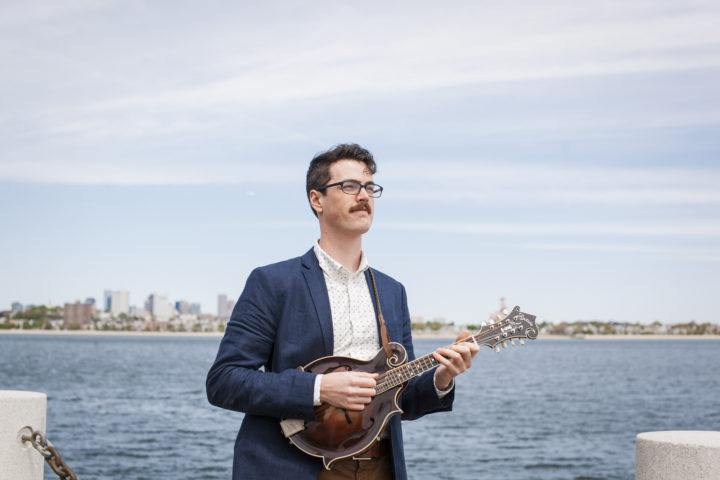For music lovers, the word supergroup can bring to mind very good jazz, very profitable arena-rock, or a Three Tenors fundraiser on PBS. While bluegrass music hasn’t been immune to the whole supergroup thing, such coalitions in the genre are usually short-lived—and more often than not they don’t get the acclaim they deserve until they’re long gone.
Thus it was with greater-than-average interest that we greeted the news, in late 2012, of the forming of a true bluegrass supergroup: the Helen Highwater Stringband, comprising Shad Cobb on fiddle and vocals, Mike Compton on mandolin and vocals, David Grier on guitar and vocals, and Missy Raines on bass and vocals. All four are well-known to bluegrass fans for their work with other artists and on solo recordings and tours, but their résumés bear repeating: multi-instrumentalist Shad Cobb has been on the road and/or in the studio with such artists as Steve Earle, Willie Nelson, the Osborne Brothers and the John Cowan Band; Nashville Bluegrass Band member Mike Compton has also played with John Hartford, Ralph Stanley and Elvis Costello; IBMA award winner David Grier has, through a series of recordings and concert appearances, pioneered the genre of solo flatpicking while pushing that instrument’s bluegrass boundaries ever further; and Missy Raines, also a winner of multiple IBMA awards, fronts her own band—the New Hip—and has toured with Claire Lynch and Jim Hurst.
All four members of the Helen Highwater Stringband are also writers, and all take turns on lead and harmony vocals, both live and in the studio. (Their sole commercial recording as of this writing is an eponymous five-song EP, available here.)
Soon after the band’s formation, HHS began making appearances at the Fiddle House, Carter Vintage Guitars, the Station Inn and other venues in and around Nashville: a natural choice, since that’s where the members of the group all live. Before long, their videos began popping up on YouTube, giving non-Nashville residents their first taste of the group’s masterly picking, lofty vocal harmonies and the sort of insightful (and usually very funny) between-song banter one expects from such experienced entertainers. Most important of all, it’s clear from the first note of each selection that this is a band—a crisply tight ensemble with the drive of a single machine, notwithstanding the uniqueness of its individual parts: Cobb’s richly-toned fiddle lines insinuating themselves around each melody, Raines’s perfectly timed and subtly nuanced bass playing, Grier’s endlessly creative, edge-of-your-seat solos and the way that Compton channels the pure, original essence of bluegrass every time he touches his mandolin. These four players are unexcelled at making the impossible seem easy.
How did such a natural—one might even say inevitable—grouping come about? I asked that of all four members, half-expecting a Rashomon-like assortment of differing accounts, but finding near-unanimity instead:
David Grier: The way I remember it, I got called to do a festival, and I thought, “Great, I’ll just do it by myself!” But they wanted a full band, so I called Mike, and we asked ourselves, “Who else can we get?” So we asked Shad Cobb, and then, for a bass player—well, we’d worked with Missy somewhere else. And there we were: they were all available and willing. So we did that festival, and then we decided, “Hey, man, this is pretty nice—let’s do this again!” And the next thing you know, ol’ Jed’s a millionaire . . . ! [laughs]
Mike Compton: I don’t recall what we said exactly, but Grier and I agreed that Shad’s pretty versatile, and could play most anything, and Missy’s a great performer—and we all knew each other.
Missy Raines: Because it was just a one-off gig, at the time we didn’t think we’d be playing again. You know: we never thought about it being a band at that moment in time. We were just doing covers, standards, that sort of thing, and a lot of David’s tunes. But as we were rehearsing, I felt that is was really coming together pretty easily, and it was really fun to play with these guys. And I realized that, even though I had known all of them for a very long time, we hadn’t played together in that configuration, exactly like that. We did the gig, and it was so much fun: Throughout our time on stage together, the music really clicked! And basically, when the gig was done, we were, like, “Hey, this was really fun, you know, what do you all think about trying to do something more?” And then we started thinking about these ideas, and having discussions about what everyone was doing, and how we could fit this band in, and all that. And at the end of the day, we all seemed to feel that it was worth it, and everyone was on a page where, even though we were committed to doing the things we were already doing, we all felt that we could make time for this band.
Shad Cobb: The idea got born: we had a lot of fun, and we had the idea that we’d like to do it some more. We all live close together, so that makes it even easier.
DG: We do see each other at picking parties occasionally.
MR: When I first came to [Nashville], I played with the Roland White Band, and David was also playing with that band at that time: we weren’t full-fledged members, but we were doing a lot of gigs with Roland at the Station Inn. So we played a lot together, and we saw a lot of each other at the Station Inn, and David and I are from a similar part of the world—David’s from the Baltimore, Maryland region and I’m from northern West Virginia, just outside Cumberland, Maryland. And we’re about the same age. As we became friends, we shared that—and now, we look for Maryland crab more than the average person around here! [laughs] When either of us has it, we have to send the other a picture, as sort of a one-up!
MC: We had a couple of [band] names that wouldn’t float. And I think that Helen Highwater was something that Grier had heard, someplace. Originally, I think we all decided that the Grouchy Bastards would be the best name. [laughs] And we were all behind it 100 percent, but nobody would book us! [laughs] I admit, I was a little surprised that people were still as prudish as they are.
MR: Yes: the Grouchy Bastards! [laughs] And we all just thought, “Yes—that’s it!” [laughs] We gave it some very serious thought, but then we got some counsel that that might not be the best idea, marketing-wise. That’s when David came up with Helen Highwater, and then we decided to make it Helen Highwater Stringband, because we thought that fit what we were doing a little bit better.
I wondered about the adjustments necessary to go from working as a sideman to playing in—and writing for—a band with presumably long-term goals. Shad Cobb, who hails from northern Wisconsin, says he played in a family band from the time he was ten years old (his brother Jesse Cobb, who plays mandolin, was one of the founding members of the Infamous Stringdusters), but Helen Highwater is his first professional band: “I’ve always been a sideman, you know? This is all new to me!” I asked Shad if he approaches soloing differently in a band setting…
SC: Yeah—it’s funny, but when I’m playing out, depending on who I’m playing with, there’s a different chemistry. Depending on who I’m playing with, I kind of feed off what they’re doing. But I do it subconsciously, I guess—I don’t consciously think about it.
MR: When I play with David and Mike and Shad, it just feels like… I was meant to do that. I did always know that I wanted to play in a band with Mike Compton. I just love his mandolin style: You know, there’s so few people left who play that style.
DG: It’s very, very simple: It’s a different situation, so I play differently. It’s that easy. In a band, it means, Don’t be playing all the time. Back someone up—give them a solid foundation so they can take a solo. You know? Fill in behind the vocalist—or not! You don’t have to play all the time! Do what you think is complimentary, is rhythmic. Those are the main things.
SC: As a sideman, I sang harmony parts before. I played with John Cowan for a long time, and I sang harmony with him. But I never sang much lead—on-stage, that is: I sing a lot around the house! [laughs]
MC: I’m like a lot of folks around here that play an instrument of some kind: not really known for being a singer, of sorts. That was one of the comments that was made when we was first gettin’ together, and word got out that we were looking to work and to take this thing out for a while: “We’re wondering who was going to do the singing?” You know, none of us was known as singers. And I think we also just—[laughs]—we also looked at it as a challenge: Well, I don’t know about that…!

Finally, I wondered how everyone in the band feels about being labeled by their promoters as a supergroup . . .
MC: Well, certainly! [laughs] I think I take it with a grain of salt: Okay—if you say so!
DG: It’s a weird tag to put on a band. I think they just do it ’cause we’ve been around for a long time [laughs], each of us, individually: They know our names. Mike, he’s played with the Nashville Bluegrass Band, he’s toured with lots of artists, he’s been around. And Missy’s been around, too: she started playing when she was a kid—and Shad, too. And me! So we’ve all been playing since we were children, and we all moved here: None of us are from Nashville—we all gravitated there, because that’s where it’s happening. And we all wanted to be where it’s happening, so that’s how we got there! So I guess it all depends on what your idea of a supergroup is, you know? I mean, we’re really just a bunch of people who play well. If that’s a supergroup, then, okay—whatever!
MR: It’s always uncomfortable when one refers to you in that way. But on the other hand, I feel that, you know, we’ve paid a lot of dues. That doesn’t make up for the supergroup label, but it makes you old enough to not really worry about it! [laughs] We’ve paid a lot of dues. And I’ve had a pretty fun career, but doing this—the moment we first start playing and the notes fit together, I always get this hit, this blast, like an endorphin hit: It just makes me feel so good. It feels very natural: It’s not that it isn’t hard or that I don’t have to work to keep up with these guys, but the kind of music that we’re playing just feels so natural, and I think that comes from our shared background. This is one of the most fun things I’ve ever done, being in this band!
Photographs by Dan Boner
Editor’s Note: Look for an in-depth feature on mandolinist Mike Compton in the Fretboard Journal #39, out May 2017. Subscribe here to start with that issue.


